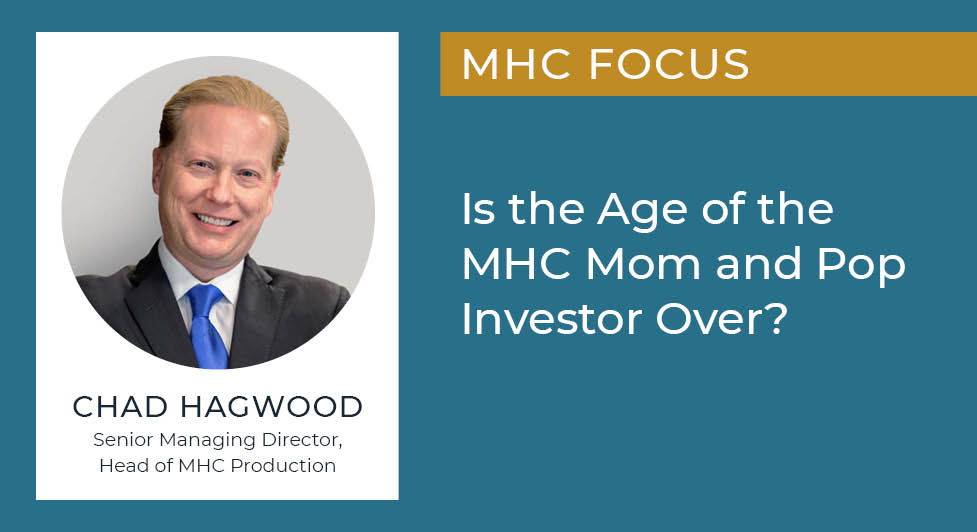This is part three of a six-part series on MHC insights and strategies by Chad Hagwood.
With manufactured housing communities (MHCs) seeing record-high valuations and rising competition, smaller owners and operators increasingly face an uphill climb.
The number of billion-dollar funds in the MHC space is steadily increasing, with few signs of slowing down. In some cases, portfolios have hit the market in recent years with asking prices of $500 million-plus.
Of course, decades before large private equity firms and other institutional investors entered the market, the MHC business was largely operated by mom-and-pop investors who saw the opportunity to build a viable housing model from the ground up. In recent years, many of those entrepreneurial investors have been replaced by larger firms with deeper capital pools, stronger equity backing, and greater access to debt financing.
That raises an important question in 2023: Is the age of the MHC mom-and-pop investor over or coming to an end?
It is certainly getting tougher for many folks, and entrepreneurial investors today need to be well-equipped with the best investment and financing strategies and advice. But there are still entry-level opportunities and various financing options for those with smart plans who may fall slightly below the mid-market level.
Here are some ways that smaller MHC investors can get a leg up in today’s market.
Find the Right Entry-Level Markets for MHC Upside Gains
It’s no secret that MHC investment activity is especially hot in California, Arizona, and Florida. While that doesn’t exclude smaller owners and operators from finding new opportunities, it creates a higher barrier to entry and a more competitive playing field in these markets.
At the same time, the need for more affordable manufactured housing in other states is steadily rising, which could offer a lower barrier to entry for smaller investors.
Metro areas with fast-growing populations and a lower cost of living are typically a good place to start. According to a 2022 Multi-Housing News analysis of U.S. Census and Yardi data, Reno, Nevada; Omaha, Nebraska; and Greenville, South Carolina are a few of the secondary and tertiary markets that offer upside potential for multifamily that should apply to smaller MHC investors as well. For instance, Reno saw a 15.3% population increase between 2010 and 2020. Population growth and employment rates are similarly favorable for the other cities mentioned.
Tap Into Accessible Debt and Equity Sources
On the debt side, agency lenders are perhaps the safest bet for smaller MHC investors. Fannie Mae and Freddie Mac both offer small loan options that start at $1 million with relatively simple application processes for MHC and other multifamily investors looking to start low stakes.
On the equity side, there are also several ways that smaller MHC investors can make deals pencil out. Some of the more viable options today include syndication deals and crowdfunding platforms, which can help level the playing field at a time of heightened competition in the MHC market. Smaller investors can team up with a more experienced sponsor to help acquire and manage a manufactured housing community or park in accordance with local laws and property codes.
By pooling funds through various channels, investors of all types can find new market opportunities. But they still need to understand the nuances of the MHC business and care about the people behind their investments, which is a tremendous responsibility.
Operating manufactured communities requires a keen understanding of property and tenant needs as well as strategic financial planning. Joining an industry association such as the Manufactured Housing Institute can provide important resources.
Building a Small MHC Portfolio with a Smart Gameplan
Those who helped build the booming market in manufactured housing have clearly made their mark.
However, the newest generation of smaller investors still has a chance to tap into one of the U.S. housing market’s most recession-proof asset classes.
But today’s many pressures—from rising interest and insurance rates to rising competition—call for clear and organized investment and financing strategies. Smaller investors should consider starting out small, after researching potentially friendly tertiary and secondary markets, educating themselves on the legislative landscape as it pertains to MHCs, and collecting as much market data as possible. Have a plan and find a financial partner ready to help you execute it.
Entry-level sponsors with the right equity backing and investment opportunities should contact the MHC experts at Lument today and stay tuned for more insights on the MHC market.

